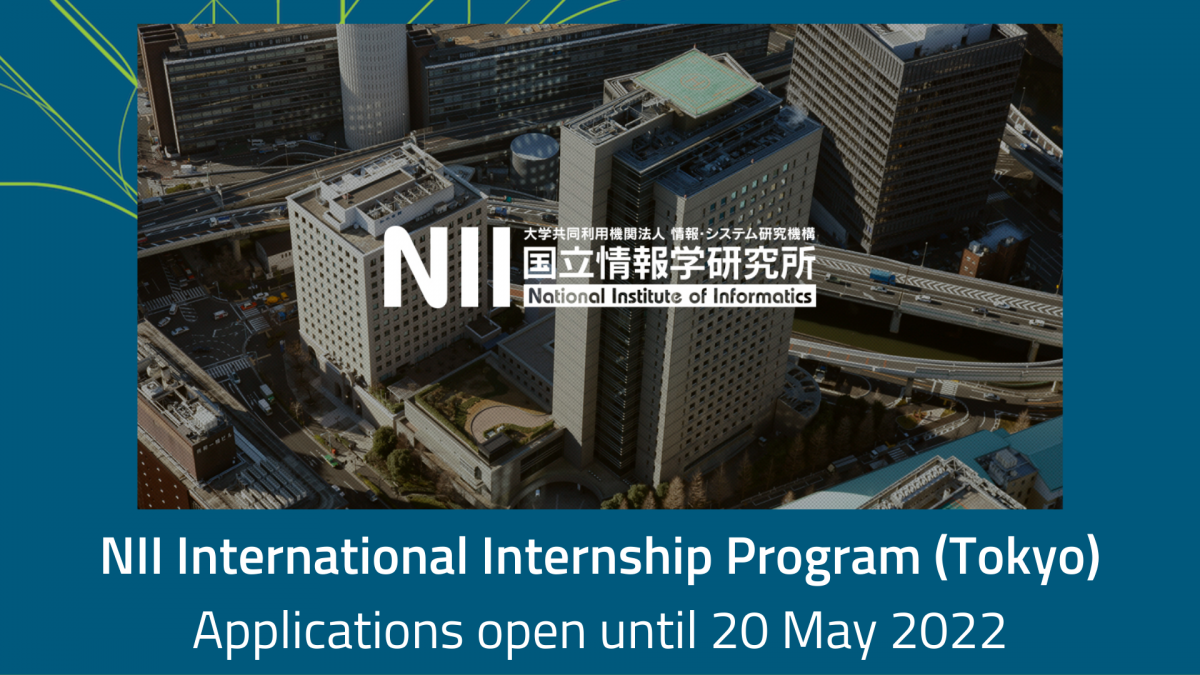
NII International Internship Program (Tokyo) – Applications open until 20 May 2022
The International Internship Program at the National Institute of Informatics (NII), Tokyo, is back following limitations due to the COVID-19 pandemic.
The NII International Internship Program is an exchange activity with students from institutions with which NII has concluded a Memorandum of Understanding (MOU) agreement, including INESC-ID. This incentive program aims at giving interns the opportunity for professional and personal development by engaging in research activities under the guidance and supervision of NII researchers. Both MSc and PhD students are eligible.
The internship activities should extend for a period of 2 to 6 months. A scholarship of about 171,000 yen per month is granted. However, the costs to travel to Tokyo are not included. The internship should start before the end of March 2023.
Candidates should contact Prof. Rui Prada (rui.prada[at]gaips.inesc-id.pt) and send him the application form, a detailed CV (grades included), and a motivation letter by *May 20th*. Candidates need, to contact potential supervisors at NII, by email, for the topics they want, beforehand. This email exchange is needed in the application process as well.
More information, including the list of topics and the application form, can be on the program’s website.
We spoke with Prof. Prada about the NII program. Here are a few more details on this scheme:
How did this collaboration with the NII Tokyo start?
[Rui Prada:] It all started after a six month visit in 2009. I went to Professor Helmut Prendinger’s laboratory to work on games applied to the 3D Internet, which is currently better known as “Metaverse”. We explored the use of SecondLife and OpenSimulator for teaching games, and I developed a game about the environmental impact of agriculture. During my stay I learned about the MOUs that the NII develops around the world and I decided to start one for INESC-ID. The agreement has been in effect since 2010.
What type of project/collaboration are you developing?
[Rui Prada:] Initially, we developed games applied to various domains, e.g., for laboratory safety training or to collect navigation data from drivers to create models about their ecological behavior. This game was exposed to the public in several places, in a museum and online, and also involved the collaboration of an Australian institution. More recently we have been working on interaction with robots and artificial intelligence models for unmanned drones.
I emphasize, however, that although a large part of the collaboration with the NII passes through me, the collaboration has extended to other INESC-ID researchers, for example Bruno Martins and David Matos.
What do you see as being the value of this collaboration? What type of outcome or future directions do you expect?
[Rui Prada:] International collaboration is always positive, but this one in particular helps us to see research problems from different perspectives due to the cultural differences that exist between the two countries. One of the current challenges we are working on focuses on the study, design and development of technology that supports a future reality, perhaps not too distant, in which we live together with different types of drones in our society. The question that arises is what infrastructure does a city need to allow millions of drones to cohabit with people. For example, you have to think of a traffic management system (probably in the air space), which is expected to be very intense.
I want to point out that this MOU has a very important feature, as it financially supports several student internships per year at the NII. So far we have been able to send 38 INESC-ID students for 6-month internships at the NII. This collaboration therefore opens up an excellent opportunity for our students. Most return with a very enriching experience, but some stay, developing their career there. One of the first students to go under this arrangement ended up creating a company in Tokyo that has already opened an office in Lisbon and employs people who were at NII: Spider Labs.
